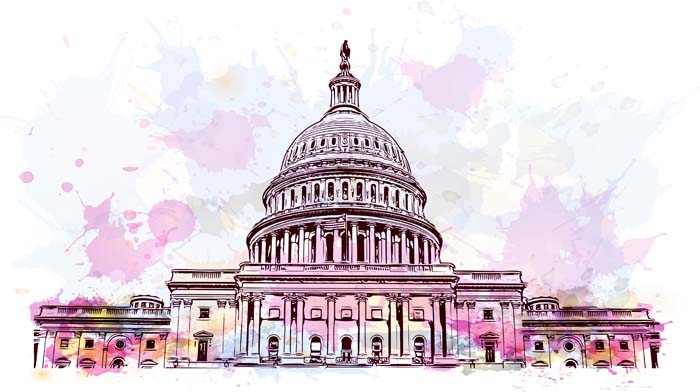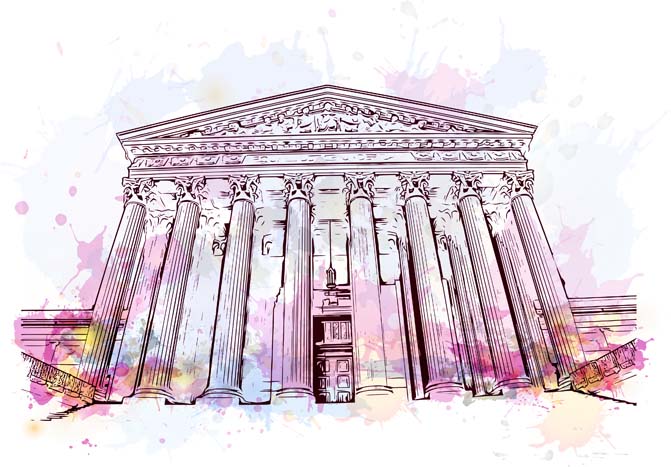Alumnae in Politics: In Their Own Words

by MaryAlice Bitts-Jackson
Dickinsonians have always served across the spectrum of political careers, beginning with our college’s founder, a signer of the Declaration of Independence. Now more than ever, many of these Dickinsonians making a difference in D.C. and beyond are women. Some are state and federal officials; others are Hill staffers, campaign workers, advocates, activists and policy wonks. You’ll find more alumnae in political finance, law, communications and public relations and across the government and nonprofit sectors.
In the wake of the 2018 midterms—during which record numbers of Democratic and Republican women ran for and earned seats in the House and Senate—we’re shining a light on Capitol Hill, where Dickinson women create an impressive collective presence. We also reached out to alumnae who work behind the scenes to support women in office, including one alum who’s been on the front lines of that struggle for two decades, and two alumnae who work in other areas of politics but are dedicated to the cause as volunteers.
Together, these Dickinsonians help bring the passion and perspectives of more than half of the American population more fully into political life, and they show us that when women face distinct challenges, they rise to the occasion—sometimes, in extraordinary ways. Case in point: PA State Rep. Kate Klunk ’04 actively negotiated a bill while in labor with her daughter, Grace.
“The bill needed one more vote, and I was determined to get it done,” says Klunk, who, along with fellow PA Rep. Valerie Gaydos ’89 and state Sen. Lindsey Williams ’05, is one of the first three Dickinson women to serve concurrently in Pennsylvania’s House and Senate. “Delivering Grace and getting my first bill signed into law at the same time were both labors of love.”
To spotlight the good work these women do, we asked them a few questions, and an assortment of their responses follows. We know this feature doesn’t cover all the Dickinson women working in the political sphere, and that there are alumni of all gender identities doing great things in the wide world of politics. We welcome your suggestions for future features at dsonmag@dickinson.edu.
What inspired you to enter this field?
“I took political science classes freshman year, and after interning in D.C., I really caught the bug. I took my senior seminar with Professor Vanessa Tyson, and while our politics couldn’t have been more different, we spent hours talking about the presidential election, the financial crisis and her experiences in politics. Those conversations, and my Philosophy of Law class, made my decision for me.” —Rebecca Shaw ’09, chief of staff for a member of Congress
“Completing an internship with U.S. Sen. Heinz during my senior year at Dickinson was certainly influential, but I was interested in entrepreneurship and pursued that first. I do believe that starting and running my own business and investing in others for so many years ultimately makes me a better legislator, and that people with experience in life and business are really who our founding fathers intended for these roles.” —Valerie Gaydos ’89, PA state representative
“Dean [Elizabeth] Farner encouraged me to apply to be student liaison for the Carlisle Borough Council. This inspired me to intern for a governor the following summer and for a senator after graduation.” —Madeleine Granda ’18, assistant to the scheduler, U.S. Senate
“I majored in economics and history, thinking I’d become an attorney. Then Sept. 11 happened, and seeing our country and community come together to serve others after that tragic event inspired me to explore politics and public policy. After interning with Congressman Todd Platts, I completed a Washington Center internship at the NEC. I was applying to law schools when I received a call from my former NEC boss asking if I would work at the White House. Of course I said yes!” —Kate Klunk ’04, PA state representative
“Being the daughter of immigrants and growing up in poverty with a single mother, I’ve always had a passion for advocacy, service, social justice and civic engagement. It wasn’t until I was appointed executive director of Pennsylvania’s Governor’s Advisory Commission on Asian American Affairs that I fully realized what a powerful platform politics and government can be.” —Tiffany Chang Lawson ’11, director, Bureau of Campaign Finance and Civic Engagement, Pennsylvania Department of State
“I have always been interested in social justice and working with people. After graduation, I worked at a nonprofit where I mentored immigrant youth in the D.C. area. That’s when I met then-Congressman Van Hollen. Meeting such a down-to-earth and dynamic public servant piqued my interest.” —Austin Morris ’09, director of constituent services, U.S. Senate

What’s your most memorable moment on the job?
“I’ve had the opportunity to meet and work with some amazing people, including business and political leaders, presidents and celebrities.” —Anna Alburger ’13, chief of staff for a member of Congress
“Just after I graduated, I sat in the House Gallery for President Obama’s joint address to Congress on health care. It was an unbelievable experience to listen to the president of the United States speak in person, on such a monumental topic. My second most memorable moment: the first time my boss had to go to a meeting at the White House. I was escorting him, and I tried to drive onto the White House property through an exit! Secret Service was not impressed.” —Shaw
“Meeting Madeleine Albright. I’d admired much of her work as our nation’s first female secretary of state, and when she visited the Senate, my bosses surprised me with the opportunity to speak with her.” —Granda
“During the last midterm election cycle, EMILY’s List helped elect 34 new women to the House of Representatives.” —Callie Carbaugh Fines ’96, CFO, EMILY’s List
What do you enjoy most about your job?
“I like the people I work with, and I like meeting new people every day. I enjoy feeling like I’m making a difference in the world and helping people.” —Kara Getz ’93, chief counsel, U.S. House of Representatives, Ways & Means Committee
“I love that there’s always a new challenge.” —Fines
“The constituents we work for every day are my neighbors and family. I have seen the impacts of the work we do with my own eyes.” —Granda
“Working in constituent services provides the unique opportunity to change lives every single day. Even when there is gridlock on Capitol Hill, state and district offices are always working to solve problems for their constituents. And even though I’ve been in this position for about five years now, I learn something new every day.” —Morris
“Having had a career before this position enables me to use my experiences to the benefit of others. I like being a problem solver.” —Gaydos
“I love mentoring younger staffers.” —Shaw
“Sometimes I get to do big things, like help secure grant funding for affordable housing projects or sponsor legislation that gives free college to the family members of our Pennsylvania National Guard. Other times I get to do things that may seem small in comparison, but are no less important, like helping a constituent apply for a property tax rebate. I get to share in Eagle Scout celebrations, new business openings and graduations. I work with neighbors after heavy rains cause flooding. The communities of District 38 are like a family, and I’m honored to be able to work with them every day.” —Lindsey Williams ’05, PA state senator
What’s the biggest challenge?
“The campaign finance laws on the federal level are well defined and administered by one agency, but the state and local laws vary, are administered by different agencies, are constantly changing and aren’t always well defined. To make sure we’re operating under the spirit and letter of the law, we’re in constant contact with our attorneys.” —Fines
“The biggest challenge is that the same challenges keep coming back! Issues as big as health care or as specialized as flood insurance reform get ‘fixed,’ only to come back up a couple of years or months later.” —Shaw
“It’s a lot of late nights and weekends; I’ve even worked on New Year’s Day.” —Getz

What are you most proud of at work?
“I worked on a bill that would save the pensions of thousands of workers and retirees. We invited a number of families whose pensions were at risk to the House gallery during the vote. When the bill passed, they cheered. Lots of members and staff cheered as well.” —Getz
“After founding and running my own business, which included investing in other tech startups, I became the first woman president of the Pennsylvania Angel Network. I continue to work with Hivers and Strivers, a venture group of mostly military veterans. A legislator should be knowledgeable about business but should also be compassionate, experienced, mature and well rounded. I’d like to think that I am all of that! I’ve always been about fiscal accountability in business, and it’s still about that now that I’m a lawmaker.” —Gaydos
“My bipartisan relationships in Congress.” —Shaw
“I’m proud of the example I’m setting for my two children, doing work I’m passionate about and making a difference by increasing diversity in our elected officials. And I’m proud of the accomplishments of the individuals who’ve worked for me; I am amazed by the lives they lead.” —Fines
“My team. They are my work family.” —Lawson
What’s a typical day like?
“There is no typical day on Capitol Hill. I love the fast-paced environment.” —Alburger
“One day I could be in session, attending committee meetings and voting on the House floor. The next, I could tour a manufacturing facility, read to preschoolers, work to resolve a constituent issue with a state agency, meet with a nonprofit or draft a bill—or I could do all of those things!” —Klunk
How have your Dickinson experiences informed your career?
“Being on my sorority’s executive council as VP gave me valuable skills (I prepared our chapter’s taxes). Despite taking classes with him for four years and studying abroad with him in London, I never figured out Professor Doug Edlin’s personal politics. In hindsight, that’s how I learned that partisanship doesn’t matter when it comes to policy.” —Shaw
“When i started working on the Hill, many of the people who were the most helpful were Dickinson alumni or part of the broader alumni network.” —Granda
“Dickinson taught me so much about how I want to show up in the world, who I am as an Asian American woman and how to live authentically, in alignment with my values. That has been invaluable to my career. Every book I read, every class I took influenced who I am.” —Lawson
“Networking with Dickinsonians helped me find my first job on the Hill. My professors helped me strengthen my writing, a big help throughout my career.” —Getz
“The focus on writing instruction was a huge help. The language requirement also was helpful, because when you learn a foreign language, you actually learn to appreciate the nuances of your native language even more, and if you know how to write well, you know how to communicate well. Having an understanding of a variety of different disciplines also made me a better, more wellrounded entrepreneur, and now it helps make me a better legislator.” —Gaydos
“My time at Dickinson really gave me all of the tools that I need as a senator. Dickinson fostered my love of learning, which I am grateful for on a daily basis. (I often describe being a senator as drinking from multiple firehoses at once—the amount of new information can be overwhelming at times.) Dickinson also taught me to ask challenging questions and not accept ‘because that’s how we’ve always done it’ as an answer. Maybe most important, Dickinson taught me to take the time to get to know people and build meaningful relationships.” —Williams
What’s a highlight of your time at Dickinson?
“The swim team was a great group, and I reached a level in swimming that I didn’t think possible. Swimming is still an integral part of my life, as are the friendships I forged.” —Fines
“Being accepted into the Washington Center program and securing an internship with President George W. Bush’s National Economic Council (NEC). At age 21, I had a front-row seat to history.” —Klunk
“My year studying abroad in China, at Peking University, interning at CNN’s Beijing bureau and the sit-in protest that my peers and I coordinated to address sexual misconduct policies.” —Lawson
“The small group living in the townhouses generated many lifelong friends. Playing Division III women’s lacrosse. Completing internships at both the U.S. Army War College and with U.S. Sen. Heinz. Working as a student athletic trainer and for food service. Too many stories come to mind!” —Gaydos
Any advice for current students considering a political science major or a career in politics?
“People will be willing to help you succeed if you are a nice, kind-hearted person and show a willingness to work hard.” —Klunk
“Get a job in the private sector, live life or work in a sector other than government to first understand how most people live.” —Gaydos
“Networking doesn’t mean collecting business cards. It means forming relationships with people and keeping in touch, even—and especially—when you don’t need a job.” —Shaw
“Reach out to alumni and ask them to connect you to other people who may be able to guide your employment search. People want to help, but it is up to you to ask for it.” —Granda
Read more about how the political science department at Dickinson helps to prepare students for success in political careers (and beyond) in "Preparing to Scale That Hill."
Read more from the fall 2019 issue of Dickinson Magazine.
TAKE THE NEXT STEPS
Published November 18, 2019